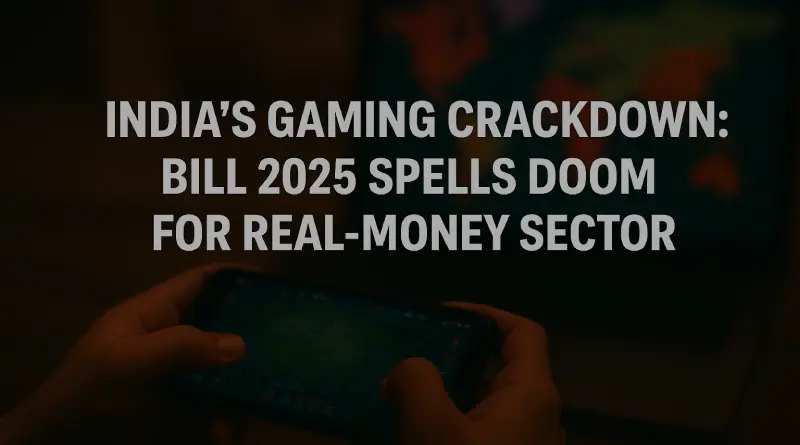India’s Gaming Crackdown: Bill 2025 Spells Doom for Real-Money Sector
Introduction
On Aug. 20, 2025, the Indian government enacted the Promotion and Regulation of Online Gaming Bill, 2025, banning in a blanket manner real-money online games (RMG). Both Lok Sabha and Rajya Sabha passed this legislation that is aimed at the platforms Dream11, MPL, and PokerBaazi, on the grounds of addiction, monetary disaster, and threats to national security. The shift will impact an industry worth 3.29 billion that is 85 percent of the country’s total 3.7 benefit to India, which will wipe out twenty lakhs of employment and a loss of 20,000 crores in yearly GST.
Bill Provisions and Enforcement
The bill outlaws (prohibits) any game played with monetary stakes, whether based on skill or chance, putting an end to a decades-old debate. They are cognizable and non-bailable, with fines going up to three years in prison with a 1 crore fine on operators and two years with 50 lakhs for advertisers. It states that the banks, NBFCs, and payment gateways should stop transactions, and individuals face personal liabilities as directors. It has proposed a National Online Gaming Commission that will regulate esports, with social games with RMG platforms being shut down immediately. Offshore operators are also subjected to extraterritorial powers.
Industry Fallout and Reactions
Accounting for 10 percent of revenues in FY24, real-money gaming is expected to reach 9.1 billion in FY29. Dream11 (358 crores cricket sponsorship) and Games24x7 were the major players, and Nazara Technologies shares went down by 20 percent. Industry associations AIGF, FIFS, and EGF lobbied Home Minister Amit Shah to reverse the decision; otherwise, they would face 400,000 online company closures and a move to unregulated offshore sites. By FY24, the industry had paid a tax of 948 million, as stated by the Finance Minister, Nirmala Sitharaman.

Local Context: India's Gaming Boom at Risk
In India, with half of its population as gamers, RMG did well in the big cities such as Bengaluru and Mumbai. Post-2023 raise in GST to 28%, strained growth persevering through 2 trillion rupee retrospective dues. The bill overlooks the court decisions that have differentiated between games of skill and chance, and therefore this bill may be challenged as being unconstitutional in regard to interstate commerce and state regulation of gambling.
Unique Insights: Offshore Shift and Legal Battles Ahead
The prohibition will also push customers towards illegal sites, further increasing fraud and addictions, which is the reason for the developing policy. Esports carve-outs protect the entry-fee tournaments, but RMG is dead, and thus it may fear the 25,000 crore of FDI. Legal experts believe cases will be taken to the Supreme Court on the precedent of Karnataka. There was a harder-line implementation option in regulating the industry, such as licensing and capping of expenditure, which would have provided a balanced protection and expansion, but the blanket restriction threatens to strangle innovation in an industry that accommodates engineers and creators.
Conclusion
The Online Gaming Bill 2025 is a landmark crackdown, focusing on the public’s welfare and not money. While tackling real issues, it risks extranfacağı, a whoop industry. The game stakeholders are looking forward to amendments; otherwise, the gaming industry of India may disappear underground.
Disclaimer
The information presented in this blog is derived from publicly available sources for general use, including any cited references. While we strive to mention credible sources whenever possible, Web Techneeq -Best Digital Marketing Agency does not guarantee the accuracy of the information provided in any way. This article is intended solely for general informational purposes. It should be understood that it does not constitute legal advice and does not aim to serve as such. If any individual(s) make decisions based on the information in this article without verifying the facts, we explicitly reject any liability that may arise as a result. We recommend that readers seek separate guidance regarding any specific information provided here.

